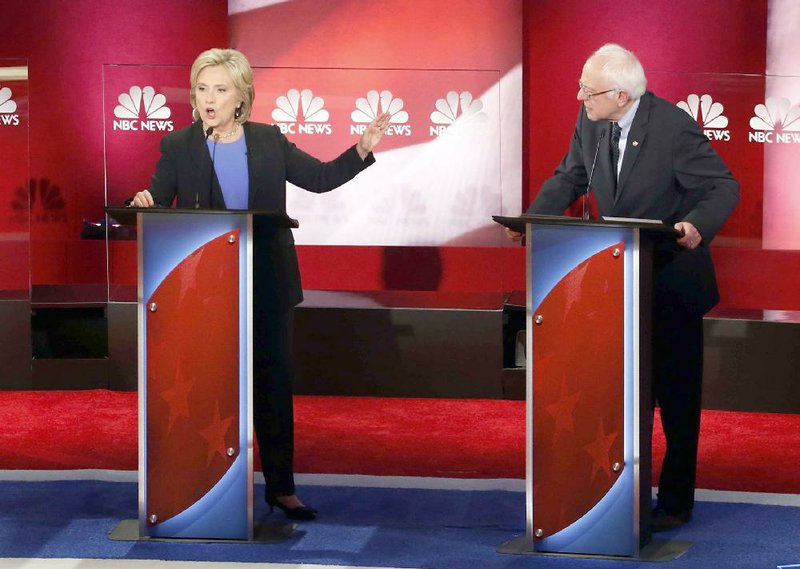CHARLESTON, S.C. -- Hillary Clinton and Bernie Sanders sparred over gun control, Wall Street and the future of health care in America as Democrats held their final presidential debate Sunday before voting in the 2016 race begins in two weeks.
Clinton rapped Sanders, the Vermont senator, for voting repeatedly with the National Rifle Association, and then welcomed his weekend reversal of position to support legislation that would deny gun manufacturers legal immunity. She rattled off a list of provisions she said Sanders had supported in line with the NRA: "He voted against the Brady Bill five times. ... He voted to let guns go on Amtrak, guns to go into national parks."
Sanders, in turn, said Clinton's assertion that he kowtowed to the gun lobby was "disingenuous" and pointed to his lifetime rating of a D- from the NRA.
Former Maryland Gov. Martin O'Malley, the third Democratic candidate in the debate, also took aim at the gun lobby, saying, "I've never met a self-respecting deer hunter that needed an AR-15 to down a deer."
The debate took place blocks from the Emanuel African Methodist Episcopal Church where nine parishioners were killed during Bible study last summer. Gun control has emerged as a central theme in the race, with Clinton citing the issue as one of the major differences between the candidates.
On Saturday night, Sanders announced his support for legislation that would reverse a 2005 law he had supported that granted gun manufacturers legal immunity.
His changed position came in a statement after days of criticism from Clinton, who had attempted to use his previous vote to undercut his liberal image.
Clinton immediately cast the latest move as a "flip-flop." Sanders said he backed the 2005 law in part because of provisions that require child safety locks on guns and ban armor-piercing ammunition. He also said he supported immunity then in part to protect small shops in his home state of Vermont.
"There were things in it that I did not like, and I was willing to rethink," he said on NBC's Meet the Press. "We have rethought."
On health care, Sanders released his plan for a government-run single-payer plan hours before the debate, and used his opening statement to call for health care "for every man, woman and child as a right." Clinton urged less sweeping action to build on President Barack Obama's health care plan.
Clinton said that under Obama's plan, "we finally have a path to universal health care. ... I don't want to see us start over again with a contentious debate."
Sanders countered: "No one is tearing this up; we're going to go forward."
Clinton has pressed Sanders for details on whether middle-class families would face a higher tax burden under Sanders' "Medicare for all" plan, which she has warned would undermine President Barack Obama's health care overhaul.
Sanders would replace the nation's existing employer-based system of insurance with one in which the government becomes a "single payer," providing coverage to all. It would eliminate co-pays and deductibles, and Sanders' campaign argued, bring health care spending under control.
"Universal health care is an idea that has been supported in the United States by Democratic presidents going back to Franklin Roosevelt and Harry Truman," Sanders said in a statement. "It is time for our country to join every other major industrialized nation on earth and guarantee health care to all citizens as a right, not a privilege."
Sanders said that he and the former secretary of state have many differences on Wall Street and "the first difference is I don't take money from big banks, I don't get personal speaking fees from Goldman Sachs."
Clinton was paid $675,000 for three speeches she gave to the firm in 2013 and her husband, former President Bill Clinton, has also been paid for appearances at Goldman events. She's also raised millions of dollars in campaign contributions from employees of banks, hedge funds and other financial services companies.
Clinton argued that the gap between her and Sanders is not particularly large. "There's not daylight on the basic premise that there should be no bank too big to fail and no individual too powerful to jail," she said.
O'Malley said that he would be stronger. "The truth of the matter, Secretary Clinton, you do not go as far in reining in Wall Street as I would," he said. Clinton responded by noting that O'Malley raised funds on Wall Street while leading the Democratic Governors Association.
The candidates are competing for black voters in South Carolina, which hosts the fourth primary contest. At a party fundraising dinner Saturday night, they vowed to change criminal justice policies.
O'Malley, asked about his crime policies in light of the death of Freddie Gray in Baltimore police custody, said that "we weren't able to make our city immune from setbacks" but, "we were able to save a lot of lives."
O'Malley said he repealed the possession of marijuana as a crime and repealed the death penalty in the state. He said incarceration rates and violent crime rates dropped under his watch.
On national security, both Sanders and Clinton voiced strong support for Obama's diplomatic overtures to Iran and opposition to sending U.S. ground troops into Syria. Clinton defended her outreach to Russia early in her term as secretary of state, but hesitated when asked to describe her relationship with Vladimir Putin.
Clinton also shed some light on what role her husband would play in her administration.
"It'll start at the kitchen table -- we'll see where it goes from there," she said with a laugh.
Then, pointing to the successes of her husband's administration, she added: "You bet I'm going to ask for his ideas. I'm going to ask for his advice."
Information for this article was contributed by Lisa Lerer, Kim Benac and Ken Thomas of The Associated Press; by Jennifer Epstein, Margaret Talev and Arit John of Bloomberg News; and and by Lesley Clark and Anita Kumar of Tribune News Service.
A Section on 01/18/2016


